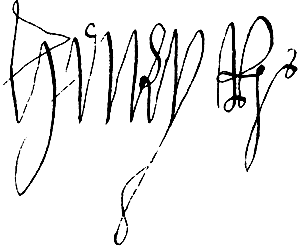

HENRY VII
King of England
|
Born: 28 Jan 1457, Pembroke Castle, Wales Acceded: 30 Oct 1485, Westminster Abbey, London, England Died: 21 Apr 1509, Richmond Palace, Richmond, Surrey, England Buried: Henry VII Chapel, Westminster Abbey, London, England Notes: Burke says he died 1 Apr 1509 and was born 26 Jul 1455 |
 |
Father: Edmund TUDOR (E. Richmond)
Mother: Margaret BEAUFORT (C. Richmond/C. Derby)
Married 1: Elizabeth PLANTAGENET (Queen of England) 18 Jan 1486, Westminster Abbey, London, England
Children:
2. Margaret TUDOR (Queen of Scotland)
3. HENRY VIII TUDOR (King of England)
4. Mary TUDOR (Queen of France/D. Suffolk)
5. Elizabeth TUDOR (b. 2 Jul 1492)
6. Edmund TUDOR (D. Somerset) (b. 21 Feb 1499)
7. Edward TUDOR
8. Catherine TUDOR (b. 2 Feb 1503)
Associated with: ¿?
10. Roland De VELVILLE (Constable of Beaumaris) (See his Biography)
Henry Tudor
by Michael Sittow
The founder of the royal Tudor dynasty was Owen Tudor, a well-born Welsh man who served as a squire of the body to England's King Henry V. The King died in 1422 and some years later his widow, Catherine of Valois, is said to have married the handsome Tudor, although it is possible they were never legally married.
Henry V was succeeded by his infant son, Henry VI. The new King (who became insane as an adult) was little more than a pawn in the so-called Wars of the Roses, a series of power struggles between the ruling House of Lancaster and the rival House of York. Owen Tudor was a staunch supporter of the King. In 1461 Tudor led an army into battle against Yorkists forces at Mortimer's Cross in Herefordshire. The Yorkist side won; Tudor was killed; Henry VI lost his throne and the Yorkist claimant, Edward IV, became King.
Owen's son Edmund, Earl of Richmond had married Margaret Beaufort, who was descended from King Edward III's son John of Gaunt, the Duke of Lancaster.
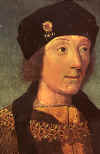
Young Henry Tudor |
Born at Pembroke Castle, Wales, 28 Jan 1457, Henry Tudor was the son of
Edmund Tudor
and Margaret Beaufort. The very fact that Henry Tudor became King of England at all is somewhat of a
miracle. His claim to the English throne was tenuous at best. His father was a Welshman of Welsh royal lineage, but that was not too important
as far as his claim to the English throne went. What was important though was
his heritage through his mother, a descendant of Edward III.
This descent from King Edward was through his third son, John of Gaunt.
John's
third wife, Catherine Swynford had born him several children as his mistress
before he married her. The children born before the marriage were later
legitmized, but barred from the succession.
Margaret Beaufort was descended from
one of the children born before the marriage of John and Catherine. Perhaps Henry Tudor bears little resemblance to the popular idea of a monarch because, unlike most kings, he was not brought up in the certainty of his destiny. Indeed, he was already in his early teens before the deaths of his royal cousins gave his claims to the throne any substance, and it was not until Henry was 27 that he won his crown in battle. He was not trained, as most English kings have been since childhood, in statesmanship, warfare, or diplomacy, but came to the throne a complete novice in those arts, which only makes his achievement the more remarkable. |
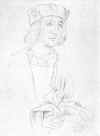
Sketch of Henry as a young man
|
His father had died only shortly before his birth, and his mother was only 13 years old at the time, so a formal guardianship devolved on his paternal uncle, Jasper Tudor, Earl of Pembroke. But Jasper was a commander in the Lancastrian army, and when Henry was only four years old, a Yorkist force was sent to take the Tudor fortress at Pembroke, where the child was living. Jasper escaped to fight another day, but it seems likely that Henry himself was taken into his enemies' custody.
The events of Henry Tudor's life for the next few years are uncertain. According to some accounts he was spirited away by his uncle to years of hiding in the Welsh wilderness; other sources maintain that he was put into the household of the Yorkist Lord Herbert after his capture. It is certain, however, that he was in the Herberts' care by 1468--only to be released the following year when the Lancastrians seized power.
The restoration of the boy's half-uncle Henry VI was short-lived. In May 1471, the King was captured after his defeat at the Battle of Barnet, and not long afterwards he was murdered.
So all at once it seemed that Henry Tudor had a good claim to the throne. The Lancastrian dynasty in the male line had been wiped out; the Beauforts now had a reasonable, though not indisputable, right to be the family's representatives in the claim to the throne. And in the Beaufort line, Margaret, Henry's mother, was the sole heiress. But a woman claimant to the English throne was a situation unprecedented since the 12th century; no woman could hope to win support on her own account. So, discarding Margaret (and ignoring Henry IV's denial of the Beauforts' eligibility to the crown), the obvious heir to the Lancastrian pretension was Henry.
His uncle Jasper was not blind to the situation, nor to the danger in which Henry would stand if he now fell into Yorkist hands. He took the 14-year-old boy with him to Brittany to keep him safe against the day when his chance might come to return as King.
It seemed that the time was ripe for their return in 1483, when the brother of the Yorkist King Edward IV usurped the throne of the late King's son, the boy Edward V, becoming King himself as Richard III. Jasper won support for his invasion scheme in Brittany, at that time a Duchy independent of the French Crown. An English uprising was to coincide with the landing of the Breton army. But Providence ruled against the bid; storms in the Channel, dividing Henry's ship from the main body of his fleet, and adverse weather conditions in England, which weakened the forces there, doomed the venture to failure. Henry returned reluctantly to Brittany.
Richard III could not rest easily knowing that his rival was free to mount another invasion at any time, and he persuaded the Breton government to hand their refugee over to him. Henry learned of the plan only just in time to evade capture, escaping over the border into the kingdom of France.
By now he had not only the Lancastrians behind him but also a coterie of disaffected Yorkists, and he was able to persuade the French King to sponsor another invasion of England. On 7 Aug 1485, Henry Tudor landed in his native Wales and marched east, gathering men to his colours.
The real matter was decided on the battlefield, at the Battle of Bosworth Field, in Leicestershire, on 22 Aug. It was here that Henry and his forces met with Richard III and Henry won the crown. It was truly through the defeat of Richard and the 'right of conquest' that Henry claimed the throne. It would need more than luck, however, to keep it there.
So Henry must show that he had become King already--whether by heredity or conquest was immaterial-- and summon Parliament as undisputed sovereign. Having sent out his writs to Members, he had himself crowned at Westminster Abbey, 30 Oct, a week before Parliament met on 7 Nov 1485. There was thus no possibility of Parliament's claiming to have made Henry King by their consent, by agreeing to honour his right by conquest or descent. All the Members were required to do was to pass a brief statute which "ordained, established and enacted" that the crown "be, rest, remain and abide in the most royal person of our now sovereign lord King Henry VII and in the heirs of his body". This left Henry's title open to no lawful challenge. It was solidified however, by his marriage at Westminster Abbey on 18 Jan 1486, to Elizabeth of York, the eldest child of the late King Edward IV.
| From the onset of his reign, Henry was determined to
bring order to England after 85 years of civil war. Henry forms the Yeomen of the
Guard and revives Court of
Star Chamber, giving it powers to try
nobility who break the law. Henry greatly strengthened the monarchy
by employing many political innovations to outmaneuver the nobility. The
household staff rose beyond mere servitude: Henry eschewed public
appearances, therefore, staff members were the few persons Henry
saw on a regular basis. He created the Committee of the Privy Council, a
forerunner of the modern cabinet) as an executive advisory board; he
established the Court of the
Star Chamber to increase royal involvement in
civil and criminal cases; and as an alternative to a revenue tax
disbursement from Parliament, he imposed forced loans and grants on the
nobility. Henry's mistrust of the nobility derived from his
experiences in the Wars of the Roses - a majority remained dangerously
neutral until the very end. His skill at by-passing Parliament (and thus,
the will of the nobility) played a crucial role in his success at
renovating government. The main problem facing Henry was restoring faith and strength in the monarchy. He also had to deal with other claimants, with some of them having a far stronger claim than his own. To deal with this, Henry strengthened the government and his own power, at the expense of the nobles. Henry also had to deal with a treasury that was nearly bankrupt. The English monarchy had never been one of the wealthiest of Europe and even more so after the War of the Roses. Through his monetary strategy, Henry managed to steadily accumulate wealth during his reign, so that by the time he died, he left a considerable fortune to his heir. |
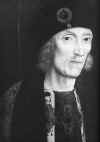
Henry VII in middle age, painted by an unknown artist |
| It was in the financial sphere that Henry's genius was most
apparent. This is not to say that he was an innovator; the Yorkist kings
had shown themselves adept at financial administration, but Henry VII so
refined their procedures of revenue collection and the apportioning of
money to government needs that, by his personal supervision, he made the
Crown solvent for the first time in many years and, at his death, left an
immense reserve to his heir.
Apart from the taxes voted by Parliament, Henry induced the Commons to enact the return to the Crown of most of the royal lands which had been alienated since 1455; by the ingenious device of having Parliament declare that he had been King on the day before Bosworth, he turned into traitors all those who had fought against him--and was thus able to claim their estates as forfeit for treason. By this extension of Crown lands, and by their efficient administration, Henry increased their value, by the end of his reign, to some _35,000 per annum. Added to this, Henry had persuaded his first Parliament to grant him customs revenue for the whole of his life -by encouraging trade through international diplomacy, he increased customs yield; by farming out his dues he ensured maximum efficiency of collection and ensured the highest feasible income; he was receiving almost _ 40,000 per annum by the end of his reign. Through improving the efficiency of his courts, the King could also rely on an income from "the profits of justice," i.e. from fines. And of course he had the ago-old "feudal dues" of medieval kingship, from the nobility, though it was only in the second half of the reign that he came to rely on the unscrupulous ingenuity of Morton, Empson, and Dudley, his hated collectors, for the increased fruits of his traditional revenue. |
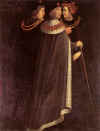
Henry VII along with Richard Empson and Edmund Dudley |
Though the King recurrently had to resort to Parliament to pay for his wars, this was considered a reasonable expense (except by the Cornishmen who revolted at being made to pay for war far away on the Scottish borders). However, he never thought it necessary to reimburse his people with the money which remained to him when he made peace--and he liked to make his price for peace a large sum of money from his former enemies.
Just as Henry made no real innovations in his financial policy, so there was a marked degree of continuity in his methods of administration. Indeed, the very personnel of his Council and departments of state were mainly "old hands" from past reigns. Previous monarchs had always striven to keep a balance in the Council between the nobility and the professional civil servants; it was only in periods of royal weakness that the magnates had played a predominant part in government. So the old theory that Henry VII was the first King to use "new men" in his government is not true, but it is true that he relied to a great extent on the abilities and intellect of such "new men" as Cardinal Morton and Bishop Fox of Winchester with much success. His was truly a government "of the talents," though the great nobles also played their part and could complain of no exclusion from their traditional role. It was to Henry's advantage that the Wars of the Roses had reduced the numbers of his nobility, weeding out men who had earlier been so "overmighty" in their dealings with the Crown. But he took no chances. With his usual forethought, Henry restrained his nobles' old tendencies to collect private armies; in 1487 he enacted a law against "livery and maintenance" and in 1504 codified existing statutes against "retaining", to prevent the nobles from keeping independent forces. But his main achievement in this sphere was in his successful enforcement of these laws, accomplished largely through the vigilance of his increasingly valuable Justices of the Peace. These men were the mainstay of the Crown in the provinces, the visible proof of the strength of the central government.
Nevertheless, England was not restored to order overnight. The Wars of the Roses had not ended with the death of Richard III, for there were still ambitious supporters of the House of York. In theory, the claimants could be discounted; Henry himself had married Elizabeth of York and married off most of her younger sisters to his own supporters. Of their cousins, Edward, Earl of Warwick, a child, was safely in the Tower, and the de la Pole brothers had made their submission to Henry after Bosworth. Thus, the main threat to Henry's security came not from the scions of York themselves but from impostors.
In 1487 Henry crushes a revolt by the Earl of Lincoln on behalf of Lambert Simnel, who claimed to be one of the missing princes from the Tower. Lambert Simnel, the ten year old boy, son of an Oxford tradesman, was coached by an ambitious priest to impersonate the Earl of Warwick, Clarence's son, and was crowned 'Edward VI' in Dublin Cathedral. After the defeat of the conspirators at Stoke on 16 Jun (when the Earl of Lincoln was killed) Henry decided that ridicule was the best weapon and made Simnel a turnspit in the royal kitchens, later promoting him to falconer. He died in his bed aged 50, a remarkable record for one found guilty of treason against the Tudors.
Henry invades France at 1491, but at the Treaty of Etaples agrees to withdraw English forces in return for a large sum of money.At 1492, a Flemish boy named Perkin Warbeck, claiming again to be one of the princes from the Tower, claims the throne and attempts to overthrow Henry. Perkin Warbeck, was a more serious and long term threat to Henry VII, since he was recognised as 'Richard Duke of York' by many of the sovereign rulers of Europe and his continuing existence dominated Henry's foreign policy until his execution in 1499.In 1497 Warbeck was captured. He might have been awarded the same mercy as Simnel (who now worked in the royal kitchens) had he not tried to escape from prison in the Tower. Henry could not afford now to let him live, and he was executed in 1499. Warwick, the innocent pawn, was beheaded at the same time, for, as long as he lived, there would certainly be pretentions on his behalf. Warbeck true identity remains a mystery, not resolved at the time, in spite of Henry's publication of his 'Confession' and still giving rise to speculation five centuries after his death.
This was not the end of the "white rose" conspiracies, for several of the de la Pole brothers still lived in freedom. Indeed, they, and Warwick's sister, Margaret Plantagenet, Countess of Salisbury, would live on to trouble Henry VIII many years later. But for Henry VII the testing-time of rival claimants was over.
|
That both rebellions had originated in Ireland was significant. To Henry's mind, too much independence had been allowed to Ireland by the Yorkist overlords of the previous reigns. Wisely, he first showed the iron fist, forbidding the Irish to continue holding their own Parliament; then to avert rebellion against such over-harsh measures, he relaxed his rule, relying on the trustworthiness of his new deputy, the popular Earl of Kildare, a rebel-turned-loyalist, to keep the Irish in check. Nevertheless, like so many English sovereigns before and after him, Henry could never rely on loyalty beyond the Dublin "Pale" area and in a few ports which lived by English trade, and he was not ready to risk full-scale armed intervention to gain total Irish obedience. Henry conducted most of his international dealings with an eye to recognition of his crown as well as to the security of his realm. He was delighted to be accepted as an ally by the Emperor Maximilian and the Spanish monarchs in 1489 in their war against France, though later it proved that only Henry had the enthusiasm to prosecute that war seriously. In the Treaty of Medina del Campo, Fernando and Isabel of Spain promised their daughter Catalina to Henry's son Arthur, and their wedding in 1501 was a tangible triumph for Henry. Scotland was another problem. The age-old traditional warfare between neighbouring kingdoms was a threat the Tudor monarch could not ignore, especially after Scotland's King James IV gave support to Perkin Warbeck. Though Henry assiduously avoided open war, and despite a formal truce in 1497, border raiding continued unchecked on both sides. A solution was found in 1499 when Henry opened negotiations to marry his daughter Margaret to James IV of Scotland as token of his hopes for a "perpetual peace." Though the agreement reached in 1502 provided a lull in the fighting for only a few years, the elevation of Henry's daughter to a throne was a valuable recognition of the permanence of his dynasty. Henry's political acumen was also evident in his handling of foreign affairs. He played Spain off of France by arranging the marriage of his eldest son, Arthur, to Catalina de Aragon, daughter of Fernando and Isabel. Arthur died within months and Henry secured a papal dispensation for Catalina to marry Arthur's brother, the future Henry VIII ; this single event had the widest-ranging effect of all Henry's actions: Henry VIII's annulment from Catalina was the impetus for the separation of the Church of England from the body of Roman Catholicism. The marriage of Henry's daughter, Margaret, to James IV of Scotland would also have later repercussions, as the marriage connected the royal families of both England and Scotland, leading the Stuarts to the throne after the extinction of the Tudor dynasty. England could not but rejoice at its king's diplomatic acumen. Diplomacy and trade went hand in hand, and in Henry's reign England's prosperity was assured. He made an advantageous treaty with Denmark for fishing rights and an agreement with Florence for the sale of English wool there; he was also able, in 1496, to extract excellent terms from the Archduke Phillip for English trade with the Netherlands, a pact formulated in the <I>Intercursus Magnus<I>. (Trading on his own account, the King made a profit of some 15,000 on deals in alum in 1505-1506.) |
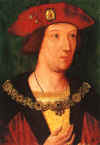
Arthur Tudor, Prince of Wales
A sketch of
Margaret Tudor from the Recueil d'Arras
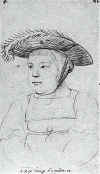
Sketch of Henry
VIII as a baby
|
From this evidence, it can be presumed that the ventures of foreign exploration by the Cabot brothers and their like, which resulted in the discovery of rich fishing grounds in the North Atlantic, were no coincidence to the reign of the first Tudor. Henry actively encouraged such exploits, with an eye to new sources of wealth.
| By the beginning of the 16th century, the King's
prestige in Europe and his security at home were assured. He had survived
the ambitions of pretenders to the throne--and without too many traces of
blood on his hands; he was strong in central government and generally
obeyed throughout the realm; he was successful in foreign war--albeit not
absolutely heroic--in the eyes of his subjects; England was almost
unprecedentedly prosperous and growing daily richer in culture, with the
extension to England of the arts and scholarship of the European
Renaissance. Yet, for all this, Henry was not personally attractive to his people. He had none of the charisma of the later Tudors. Polydore Vergil described him in his The Anglia Historia, 1485-1537. Nor, for all his achievements, has he had a "good press" in the centuries since his death. For example, one of his earliest biographers, Francis Bacon, damned the King as a miser, and it was not until recently, in the light of modern research, that his opinion has been contradicted. In fact, Henry kept a splendid Court, fully as brilliant as those of his predecessors. Nor was all his expenditure for show, for Henry's private accounts (meticulously checked in his own hand) reveal that he was generous in his payments to a children's choir which performed for him, and to a favoured Welsh harpist, and that he spent lavishly on his private zoo and his table's delicatessen. Nevertheless, the Court was somewhat sombre in the last years of the reign. Henry lost his eldest son, the promising Arthur, in Apr 1502, and in Feb 1503, Queen Elizabeth died too. Though Henry had married for political reasons, with no sentimental wooing, he seems to have been a good husband, and he was certainly fortunate that his wife gave him seven children, of whom two sons and two daughters survived infancy. Henry made several attempts to remarry--and to remarry well, having several prestigious foreign princesses in view. But complications in international diplomacy prevented his second marriage--indeed, his whole foreign policy in his later years seems to have misfired. |
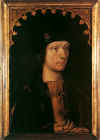
Copy of a lost portait painted around 1500
|

Effigies of Henry and
Elizabeth by Pietro Torrigiano
|
But then, Henry had never been very ambitious
in foreign affairs. He had no wish to be a glorious conqueror or an
international arbiter. He had sought merely to have his dynasty recognised
by foreign rulers and to show his people that he could hold his own among
European sovereigns; without any formalised policy, he yet succeeded in
his limited aims.
Henry VII deathmask The dying King in his Privy Chamber, surrounded by his courtiers and household: Richard Fox, Bishop of Winchester; George, Lord Hastings; Richard Weston, Esquire of the Body and Groom of the Privy Chamber; Richard Clement, Groom of the Privy Chamber; Matthew Baker, Esquire of the Body; John Sharpe and William Tyler, Gentlemen Ushers; Hugh Denys, Esquire of the Body; and William Fitzwilliam, Gentleman Usher, who holds a staff of office and closes the King’s eyes. Also present are two tonsured clerics and three physicians holding urine bottles. It was possible to keep Henry’s death a secret, as he was out of the public eye, and it was Weston who is described by Wriothesley as keeping up the pretence that the old King was still alive until 23 April.
Henry died on 21 Apr 1509 at Richmond Palace, Surrey. And perhaps in his very death his greatest achievement is revealed, for his son, Henry VIII, succeeded him peacefully, with no immediate rival to challenge the crown. Less than a quarter of a century after Henry Tudor had risked all on Bosworth Field, his throne was indisputably secure in his dynasty. As Francis Bacon wrote, little more than a century after Henry VII's death, "What he minded, he compassed". It could be debated whether or not Henry VII was a great King, but he was clearly a successful King. He had several goals that he had accomplished by the end of his reign. He had established a new dynasty after 30 years of struggle, he had strengthened the judicial system as well as the treasury and had successfully denied all the other claimants to his throne. The monarchy that he left to his son was a fairly secure one and most definitely a wealthy one. |

A bust of Henry VII by Pietro Torrigiano
|
|
One other first for Henry VII's reign was the introduction of the culinary invention called the cockentrice. The cockentrice featured the head of a suckling pig stitched to the bottom half of a turkey, and was created to impress courtiers with an unusual appearance and unique taste. Would a chef today categorize the cockentrice as a ham recipe or a turkey recipe? It is certainly a complicated dish that most chefs would avoid unless they want to experiment with a uniquely Tudor ham and poultry recipe. |
|
|
The family of Henry VII and Elizabeth of York |
The Dynasty Portrait or The Whitehall Mural |